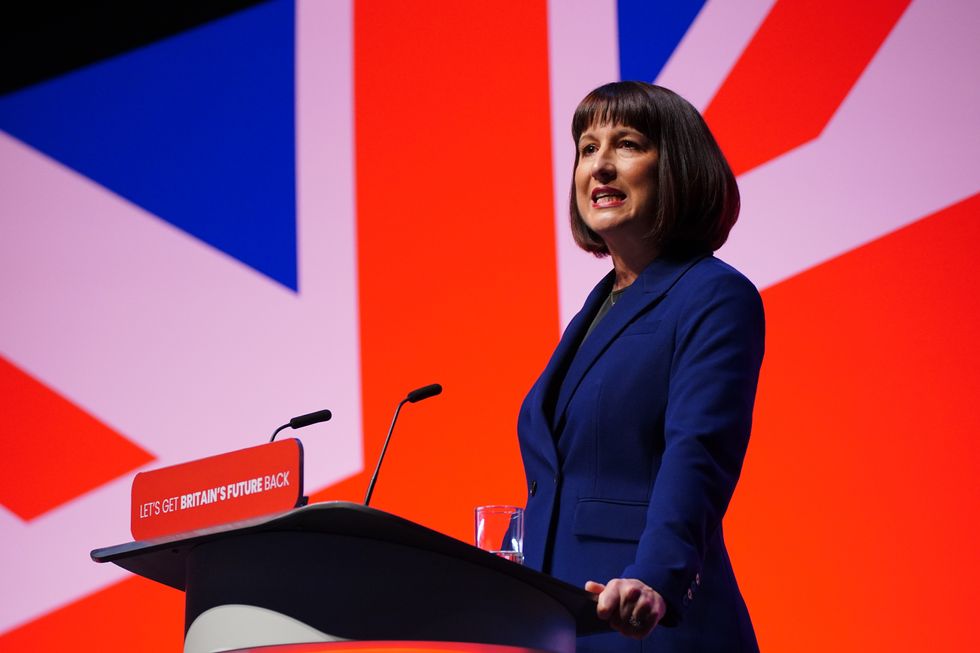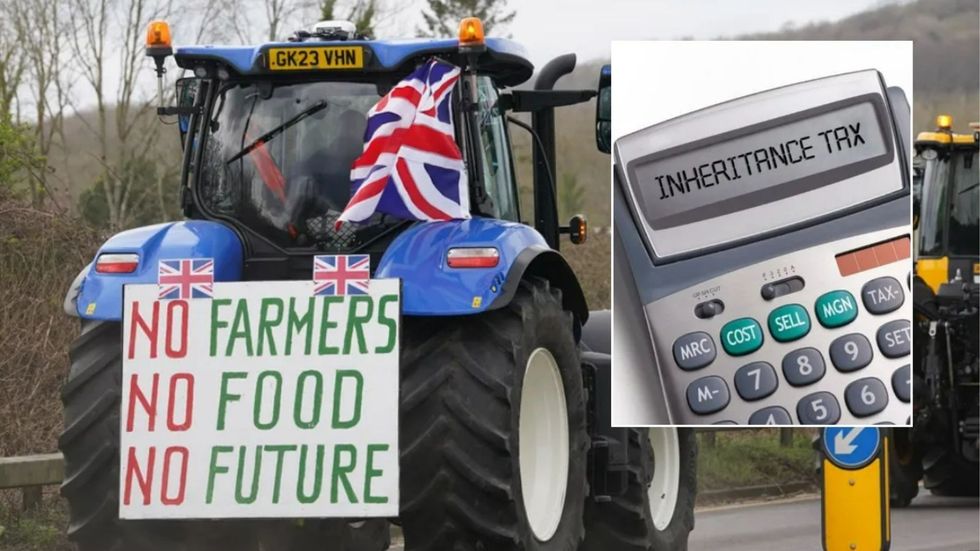Patrick O'Donnell
Guest Reporter
Britons could still be hit by Labour's "death tax" raid despite attempts by families to avoid paying any inheritance charge, experts are warning. Research suggests that more than 200,000 households will pass on their primary home to their children to avoid paying inheritance tax (IHT) but analysts claim this could backfire.
Figures from Land Registry suggest that the number of properties being transferred for free between family members will jump by over 45 per cent to around 220,000 this year. Despite this trend, homes could still come under the IHT bracket if Britons do not adhere to strict HM Revenue and Customs (HMRC) rules.
During her Autumn Budget, Chancellor Rachel Reeves unveiled an overhaul of the inheritance tax regime, bringing pensions and farms into the levy's purview. These changes will not come into effect until April 2027 but this is not stopping households from taking action.
IHT is a levy on the estate of individuals who have passed away. An estate takes into account someone's property, possessions or money. It is charged on estates valued above the £325,000 threshold. This allowance can be extended to £500,000 under the residence-nil-rate-band (RNRB) when passing over primary homes.
Previous Land Registry data suggests that around 130,000 properties are passed down to family members each year, according to a Freedom of Information (FoI) request by Hamptons. For 2023, this number increased to 152,000 with another hike projected in the wake of Reeves's inheritance tax raid.
Do you have a money story you’d like to share? Get in touch by emailing [email protected].

Under the "seven-year rule", an individual is allowed to pass down money or assets without paying any tax to someone else seven years before their death. Assets handed over three years before death are charged at 40 per cent. Gifts made between three to seven years are also taxed, albeit at a tapered rate.
Recent research from Standard Life suggests that around a third of Britons are considering giving away money to family members more regularly to avoid paying death duties.
On top of this, the insurance firm's survey found that one in five were planning to buy an annuity to mitigate any large IHT bill. An annuity converts someone's savings into a yearly pension which guarantees a retirement savings pot for life or over a certain period of time.
Despite this trend, Mike Ambery, Standard Life's retirement savings director, reminded Britons of the importance their assets play in bolstering pension savings in later life.

He explained: "While it’s natural to consider how to minimise inheritance tax liability through strategies like increased gifting, it’s important that people consider their own retirement incomes and remember that pensions need to last for the whole of retirement."
Andrew Marr, a manager partner at tax specialists Forbes Dawson, added: "The tax appeal here is massive. Although gifts do generally trigger capital gains tax based on the asset’s market value, this is not usually the case for the family home.
"Also, if the parents survive seven years from the date of the gift, assuming they do not stay in the property, then the value will be outside of their estate for inheritance tax purposes."
Rob Morgan, the chief analyst at wealth management firm Charles Stanley, noted that the increase in families gifting properties between generations primarily comes from concerns the Chancellor will hike capital gains tax (CGT) rates.
"Going forward this trend will surely accelerate. In the Autumn Budget, the Chancellor unveiled plans to include inherited pensions for inheritance tax purposes from April 2027, as well as restrictions to Business Property Relief and Agricultural Property Relief from April 2026," Morgan said.
"It means a revision of plans for those already affected, as well as fresh thinking for the many more families drawn into paying it, and one of the simplest and most effective strategies available is gifting."
LATEST DEVELOPMENTS:

An HM Treasury spokesman told GB News: "More than 94 per cent of estates will continue to pay no inheritance tax in 2024-25, and estates can pass on up to £1million without paying IHT when a tax-free allowance is passed to a surviving spouse or civil partner."
According to the Treasury, most estates will continue to have no inheritance tax liability following these changes. Out of an estimated 213,000 estates with inheritable pension wealth in 2027 to 2028, 10,500 estates will become liable to pay IHT here this would not previously have been the case.
Some 38,500 estates will pay more inheritance tax than would previously have been the case, a representative from the Treasury claims
Those affected are estimated existing average IHT liability of £169,000, increasing by around £34,000 on average when pension assets are included in the value of the estate.
Find Out More...
Figures from Land Registry suggest that the number of properties being transferred for free between family members will jump by over 45 per cent to around 220,000 this year. Despite this trend, homes could still come under the IHT bracket if Britons do not adhere to strict HM Revenue and Customs (HMRC) rules.
During her Autumn Budget, Chancellor Rachel Reeves unveiled an overhaul of the inheritance tax regime, bringing pensions and farms into the levy's purview. These changes will not come into effect until April 2027 but this is not stopping households from taking action.
IHT is a levy on the estate of individuals who have passed away. An estate takes into account someone's property, possessions or money. It is charged on estates valued above the £325,000 threshold. This allowance can be extended to £500,000 under the residence-nil-rate-band (RNRB) when passing over primary homes.
Previous Land Registry data suggests that around 130,000 properties are passed down to family members each year, according to a Freedom of Information (FoI) request by Hamptons. For 2023, this number increased to 152,000 with another hike projected in the wake of Reeves's inheritance tax raid.
Do you have a money story you’d like to share? Get in touch by emailing [email protected].

Under the "seven-year rule", an individual is allowed to pass down money or assets without paying any tax to someone else seven years before their death. Assets handed over three years before death are charged at 40 per cent. Gifts made between three to seven years are also taxed, albeit at a tapered rate.
Recent research from Standard Life suggests that around a third of Britons are considering giving away money to family members more regularly to avoid paying death duties.
On top of this, the insurance firm's survey found that one in five were planning to buy an annuity to mitigate any large IHT bill. An annuity converts someone's savings into a yearly pension which guarantees a retirement savings pot for life or over a certain period of time.
Despite this trend, Mike Ambery, Standard Life's retirement savings director, reminded Britons of the importance their assets play in bolstering pension savings in later life.

He explained: "While it’s natural to consider how to minimise inheritance tax liability through strategies like increased gifting, it’s important that people consider their own retirement incomes and remember that pensions need to last for the whole of retirement."
Andrew Marr, a manager partner at tax specialists Forbes Dawson, added: "The tax appeal here is massive. Although gifts do generally trigger capital gains tax based on the asset’s market value, this is not usually the case for the family home.
"Also, if the parents survive seven years from the date of the gift, assuming they do not stay in the property, then the value will be outside of their estate for inheritance tax purposes."
Rob Morgan, the chief analyst at wealth management firm Charles Stanley, noted that the increase in families gifting properties between generations primarily comes from concerns the Chancellor will hike capital gains tax (CGT) rates.
"Going forward this trend will surely accelerate. In the Autumn Budget, the Chancellor unveiled plans to include inherited pensions for inheritance tax purposes from April 2027, as well as restrictions to Business Property Relief and Agricultural Property Relief from April 2026," Morgan said.
"It means a revision of plans for those already affected, as well as fresh thinking for the many more families drawn into paying it, and one of the simplest and most effective strategies available is gifting."
LATEST DEVELOPMENTS:
- Inside the 'tractor tax' loophole being exploited by the super-rich
- 'Triple tax raid' on inherited pensions to hit families with 84% bill: 'Eye-watering!'
- 'Labour grinch!' Reeves accused of 'stealing Christmas' as tax raid cancels work festive parties

An HM Treasury spokesman told GB News: "More than 94 per cent of estates will continue to pay no inheritance tax in 2024-25, and estates can pass on up to £1million without paying IHT when a tax-free allowance is passed to a surviving spouse or civil partner."
According to the Treasury, most estates will continue to have no inheritance tax liability following these changes. Out of an estimated 213,000 estates with inheritable pension wealth in 2027 to 2028, 10,500 estates will become liable to pay IHT here this would not previously have been the case.
Some 38,500 estates will pay more inheritance tax than would previously have been the case, a representative from the Treasury claims
Those affected are estimated existing average IHT liability of £169,000, increasing by around £34,000 on average when pension assets are included in the value of the estate.
Find Out More...